Tag : Jewish fiction
August 26, 2019 by Yona Zeldis McDonough
A Twist on Doctor-Patient Confidentiality
Radiologist and debut novelist Heather Frimmer tells the story of a mother planning her daughter’s wedding just as she receives a diagnosis of breast cancer in her new novel Bedside Manners. Frimmer talks to Fiction Editor Yona Zeldis McDonough about how her medical training shapes her life as a writer.
YZM: How did your own training as a doctor influence the writing of this novel?
HF: I work full time as a radiologist specializing in breast imaging. I interpret mammograms, discuss results with patients and perform breast biopsies.
Joyce’s story was inspired by the thousands of breast cancer patients I’ve had the honor of caring for. I used my observations to make Joyce’s journey as authentic and emotionally resonant as possible. Some of the events in Marnie’s story were inspired by or loosely based on situations either I or my friends experienced on the wards during training. I wanted to explore the doctor-patient relationship from both sides. Choosing both a mother and daughter as the protagonists allows the characters to witness and experience both sides of the relationship alongside the reader.
YZM: Why did you make Marnie a surgeon rather than a radiologist?
HF: I would have loved to make Marnie a radiologist, but I knew it wasn’t the right choice. Radiologists stare at computer screens in dark rooms while drinking endless cups of coffee—the opposite of dramatic. Making Marnie a surgeon allowed me to put her in more precarious and emotional situations and raise the stakes for her a lot more.
YZM: The men in the novel respond very differently to the news of Joyce’s cancer than the women; care to comment?
HF: That’s such an interesting observation. This wasn’t a conscious choice, but I think the difference comes from my personal experience. The men in my life tend to underplay their emotional reactions, only getting upset in the most dire of circumstances. The exception to this rule would be my wonderful husband who wears his emotions on his sleeve without shame.
YZM: During the course of the novel, Marnie struggles with her decision to marry a non Jewish man. Were you making a larger statement about intermarriage between Jews and Gentiles?
HF: My goal was not to be prescriptive about intermarriage, but rather to raise questions so readers can think about the issue for themselves. Spouses will inevitably differ in countless ways and learning to negotiate those differences is crucial for a successful marriage. As an obsessive reader, if I can remain happily married for nearly seventeen years to someone who reads less than one book a year, then anything is possible. The keys are open communication, dedication, and acceptance on the part of both partners.
YZM: Do you think you’ll use your medical background in writing your next novel?
HF: I am finishing edits on my next novel which follows a male neurosurgeon with an addiction to pills who makes the decision to operate on his sister-in-law’s brain. The story explores how this decision affects not only the course of both of their lives, but of their entire family as well. I love the way my publicist describes this book—” a complex tale of addiction, love, and survival on the operating table.” While this novel does take place in the world of medicine, it strays much further from my area of expertise. This one required a lot more research to get the details right.
YZM: What’s one question that you wished I’d asked but didn’t?
HF: I like credit to the authors who have inspired me to become a writer. Lisa Genova, the author of Still Alice and Every Note Played, along with several other wonderful novels, has been my major inspiration. I love how the way she uses her expertise as a neuroscientist to explore the details of a specific neurologic disease, its emotional ramifications and the ways the disease impacts everyone in the patient’s sphere. I’d be hard pressed to pick a favorite—her books are all that good.
I also deeply admire Jennifer Weiner’s writing—I faithfully read her novels the day they are released. The way she can make a story hilarious and compulsively readable while addressing serious topics is truly admirable. Her newest novel, Mrs. Everything, just came out in June and is her most ambitious novel yet. She’s truly outdone herself with this one.
- No Comments
July 10, 2019 by Yona Zeldis McDonough
A Novelist Brings Jewish Women to the Forefront of Crime Stories
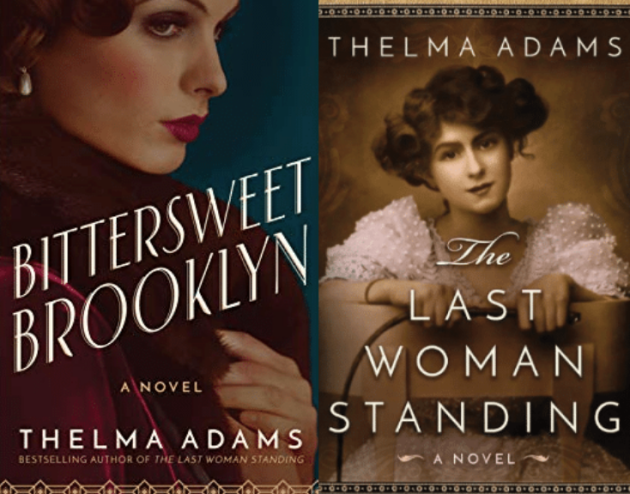 A Jewish woman married to Wyatt Earp? A Jewish woman cleaning up after a murder committed by her brother, a criminal with ties to the Jewish mafia? These are the kinds of stories that novelist Thelma Adams loves to tell.
A Jewish woman married to Wyatt Earp? A Jewish woman cleaning up after a murder committed by her brother, a criminal with ties to the Jewish mafia? These are the kinds of stories that novelist Thelma Adams loves to tell.
She talks to Fiction Editor Yona Zeldis McDonough about how she finds her subjects and what they yield in her novels.
- No Comments
July 2, 2019 by admin
Fiction: Little Hen
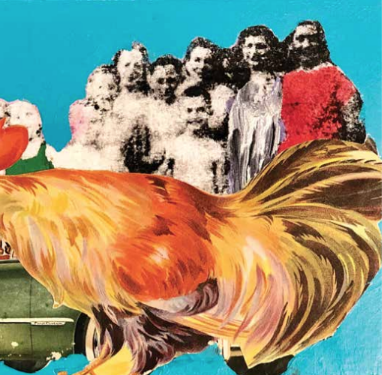 In those weeks of waxing darkness, I worked at Anna’s side, my fingers mimicking hers. We sat in the kitchen of my aunt’s place. I told Anna of my first days in the city, five years before. Of the time, for instance, my aunt had sent me for chickens and I came back empty-handed, crying into my elbow like a small child, unwilling to haggle or even to open my mouth out on the street.
In those weeks of waxing darkness, I worked at Anna’s side, my fingers mimicking hers. We sat in the kitchen of my aunt’s place. I told Anna of my first days in the city, five years before. Of the time, for instance, my aunt had sent me for chickens and I came back empty-handed, crying into my elbow like a small child, unwilling to haggle or even to open my mouth out on the street.
Anna snorted to hear of it. “What did you think would happen to you?” she said. “Afraid of a toothless chicken-plucker,” she said. She shook her head in pity and in disgust.
I wasn’t brave enough to invite Anna’s teasing more than once. There were so many ways to be wrong; at 16, I subsisted on a steady diet of small atonements. So I sat silently for hours at a time, those long evenings in the winter of 1912, while she taught me at my aunt’s Singer. She showed me how to make French darts, vertical darts, side seams. The things I wasn’t learning at the factory, where I made only sleeves, day in, day out. The lessons were Anna’s idea. She must have seen some promise in me.
Anna spoke and I listened. She spoke of her early tangles with New York: schoolmarms, landlords, a litany of bosses. And then she spoke of Vilna, where she was born. Of the time before her father disappeared. “He was a tailor’s assistant,” Anna said, speaking of her father. “To begin with.”
To Mama, Anna told me, she was Khanele, Little Anna. To Daddy: Hunele. Little Hen.
A new century. The workers in Vilna had been organizing. Jews. For who else made up the bulging undergrowth of needle-men, cutters, tinkerers, cobblers? In those days, the shtarkers—strapping Jews, too, not only Christians—were brought in, swinging pipes as well as fists. The small factory owners and the wholesalers paid to keep the striking workers in bandages. Her father used to say, Come, Hunele, we’re going to the Kitchen.
The Kitchen was in the crumbling center of the city, not far from the university and not far, either, from the Jews’ almshouse and the Jews’ hospital and other rooms filled to bursting with Jews. The Kitchen was heated by a great tile oven and, in winter and in summer, it was too warm. It smelled of cabbage and mildew. Two long tables ran front to back atop the packed-earth floor. And along the benches sat men like Anna’s father, elbows knocking those of their neighbors. She sat in her father’s lap and ate her soup. The soup was the worst she had tasted in her short life, Anna said. She nearly gagged now, speaking of it.
“But the food didn’t matter,” Anna said to me. The food was not the point. For this was the Cooperative Kitchen of the Vilna Needleworkers’ Union. Bowl by bowl, coin by coin, men like Anna’s father would unite Vilna’s workers. And after that, they would bring together all Lithuania’s, and then, in time, all of Russia’s. So Anna’s father said. The Kitchen would be the beginning, he promised, the means to nourish the consciousness of all those who didn’t set out for the West or land in Siberian prisons or (it still sometimes happened) wake up one morning as shop owners, may they rot in the earth. And in the meantime, you could get a bite to eat and dream of the future, when all men would be free.
Anna remembered the red-cheeked women stirring pots in the back. “They must have been the age then that we are now,” she said to me. Working girls. Revolutionaries. When one spoke, the others would shush her, straining to follow threads of arguments that ran up and down the tables in the din, where the men sat. Anna’s father called one over once, she told me. A girl with black braids and a pocked forehead. Galya, our comrade needs directions, Anna’s father said. The girl had nodded then. I’ll take him there myself, she said.
On her father’s lap, Anna listened to men mumbling and to men shouting. She knew some of the phrases they used. She spoke them to me now. Di natsyonale frage: the national question. Klasnbavustzayn: class consciousness. Ekonomishe teror: economic terror. But at the time she didn’t understand. Not truly.
“Now I understand,” she said, making me look her in the eye, pressing her fingers to my elbow as if to imprint those words upon my skin. She pushed back then from the table and stood beside me, not going anywhere, but standing all the same. By now I had let my aunt’s machine go idle. I didn’t want to miss a word.
Anna recalled an afternoon of endless rain. A rivulet ran below her feet on the dirt floor, there in the Kitchen. She had sat at the table with her father for so long she feared that she had wet herself; she felt between her legs and understood it was only rain that trickled between her boots. We have fists, too, her father had said then to the man across from him, white spittle at the joints of his mouth. No more fearful little Jews, he said. Anna spoke her father’s words to me.
- No Comments
September 12, 2018 by Kitty Zeldis
Anti-Semitism Among the WASP Elite
The idea for my novel Not Our Kind was born at Vassar College, where I was a student in the 1970s, where there was enough visible diversity to make a Jewish girl feel she was not alone. I encountered plenty of Jews, both students and faculty. Yet while I didn’t experience much overt anti-Semitism, I felt keenly aware that Vassar had historically excluded people like me—I was the “not our kind” of my eventual novel’s title.
I could feel it in the manners, the mores, the very air around me. Vassar was a WASP institution and bastion, and I knew I didn’t entirely belong. In fact, it was at Vassar that I acquired the nickname that became my pen name. I had commented to a friend that my Hebrew first name and Polish surname felt all wrong and that I should have been called Katherine Anne Worthington; he jokingly responded by calling me Kitty. It’s a name that stuck.
The anti-Semitism at Vassar was occasionally overt—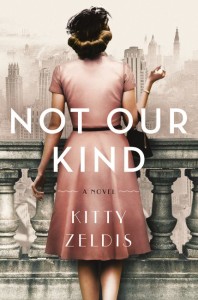 my freshman roommate casually noted, “Well, your people did murder our Lord,” a remark for which I then had no ready reply. But it was the more passive, almost nonchalant anti-Semitism that stung most. I remember an English lit class in which we’d been reading Ezra Pound and T.S. Eliot and I said that I found the stereotypical characterizations of Jews in their poetry—greedy, money-grubbing, hook nosed and so forth— upsetting. A fellow student raised his hand and said, “Oh, well, that’s what everyone was like back then,” as if that should have cancelled out my discomfort, and made it, somehow, all right. And then there was the memorable evening that I went to hear a lecture on 18th century Rococo painting that was to be given by a well-regarded scholar visiting from Germany. Before he came to the lectern, someone from the Art History department read a short bio by way of introduction. I don’t know what I expected to hear, but it surely wasn’t that during World War II, this man had been a high ranking official—a commander, a general, I don’t recall which—in the military. A Nazi, in other words, though the word was not actually said.
my freshman roommate casually noted, “Well, your people did murder our Lord,” a remark for which I then had no ready reply. But it was the more passive, almost nonchalant anti-Semitism that stung most. I remember an English lit class in which we’d been reading Ezra Pound and T.S. Eliot and I said that I found the stereotypical characterizations of Jews in their poetry—greedy, money-grubbing, hook nosed and so forth— upsetting. A fellow student raised his hand and said, “Oh, well, that’s what everyone was like back then,” as if that should have cancelled out my discomfort, and made it, somehow, all right. And then there was the memorable evening that I went to hear a lecture on 18th century Rococo painting that was to be given by a well-regarded scholar visiting from Germany. Before he came to the lectern, someone from the Art History department read a short bio by way of introduction. I don’t know what I expected to hear, but it surely wasn’t that during World War II, this man had been a high ranking official—a commander, a general, I don’t recall which—in the military. A Nazi, in other words, though the word was not actually said.
- 1 Comment
July 2, 2018 by admin
A Novel of Barren Island, NYC’s Forgotten Glue Factory
Told from the point-of-view of Marta Eisenstein Lane on the occasion of her 80th birthday, Carol Zoref’s novel Barren Island is the story of a long-forgotten factory island in New York’s Jamaica Bay, where the city’s dead horses and other large animals were rendered into glue and fertilizer from the mid-19th century until the 1930’s. The island itself is as central to the novel as the members of the Jewish, Greek, Italian, Irish, and African-American factory families that inhabit it, including those who live their entire lives steeped in the smell of rotting and burning animal flesh.
The story begins with the arrival of the Eisenstein family, immigrants from Eastern Europe, and explores how the political and social upheavals of the 1930’s affect them and their neighbors in the years between the stock market crash of October 1929 and the start of World War II. Labor strife, union riots, the New Deal, the World’s Fair, and the struggle to save European Jews from the growing threat of Nazi terror inform this novel as much as the explosion of civil and social liberties between the two World Wars.
- No Comments
June 12, 2018 by Yona Zeldis McDonough
Isolated Mothers, Searching for Miracles
The reader knows by page one of Queen for a Day that Mimi Slavitt’s three-year-old son is autistic, but if anyone told her, she wouldn’t listen, because she doesn’t want to know—until at last Danny’s behavior becomes so strange even she can’t ignore it. After her son’s diagnosis, Mimi finds herself in a world nearly as isolating as her son’s. Searching for miracles, begging for the help of heartless bureaucracies while arranging every minute of every day for children who can never be left alone, she and her fellow mothers exist in a state of perpetual crisis, “normal” life always just out of reach. In chapters told from Mimi’s point of view and theirs, we meet these women, each a conflicted, complex character dreaming of the day she can just walk away.
Taking its title from the 1950s reality TV show in which the contestants, housewives living lives filled with pain and suffering, competed with each other for deluxe refrigerators and sets of stainless steel silverware, Queen for a Day portrays a group of imperfect women living under enormous pressure. Maxine Rosaler talks to Fiction Editor Yona Zeldis McDonough about the true-life experiences that led her to write this book. (more…)
- No Comments
June 6, 2018 by Yona Zeldis McDonough
What Did Your Grandparents Do to Mine?
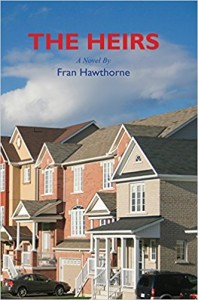 After breaking her hip in a serious accident, Eleanor Ritter’s mother, Rose, a Holocaust survivor now living in New Jersey, suddenly starts talking about her harrowing childhood in Poland and the taboo subjects she has refused to discuss for half a century—even speaking in long-forgotten Polish. Around the same time, Eleanor learns that the parents of her nine-year-old son’s soccer teammate, Tadek, are Catholics from Poland.
After breaking her hip in a serious accident, Eleanor Ritter’s mother, Rose, a Holocaust survivor now living in New Jersey, suddenly starts talking about her harrowing childhood in Poland and the taboo subjects she has refused to discuss for half a century—even speaking in long-forgotten Polish. Around the same time, Eleanor learns that the parents of her nine-year-old son’s soccer teammate, Tadek, are Catholics from Poland.
As Eleanor becomes fixated with digging into the histories of both her mother and Tadek’s family, her obsession strains her already difficult relationship with Rose, as well as her marriage to Nick, an IT technician who is himself caught up in preparing for the feared Y2K turn of the millennium.
Eleanor starts flirting with the soccer coach, ignoring her 12-year-old daughter’s growing rebellion and her son’s misery when, messing up several games, he becomes the team pariah. Meanwhile, the “sure-fire” tech stock that Eleanor bought behind Nick’s back is losing money. Even as her quest nourishes an odd friendship with Tadek’s mother, it forces Eleanor to face the unavoidable questions: For how many generations can guilt carry on? And: What did your grandparents do to my grandparents?
Hawthorne, the author of the award-winning Ethical Chic: The Inside Story of the Companies We Think We Love and seven other books about business, consumers and social issues, talks to Fiction Editor Yona Zeldis McDonough about her journey from fiction to fact and then back again.
- No Comments
May 29, 2018 by Yona Zeldis McDonough
What It’s Like to Publish Your Debut Novel… at Age 90
All this week, in the grand tradition of Victorian periodicals, Lilith will be serializing an excerpt of Sadie in Love, the debut novel from 90-year-old former magazine editor Rochelle Distelheim. Look out for new installments every day this week.
Sadie in Love: Part 1| Part 2 | Part 3 | Part 4
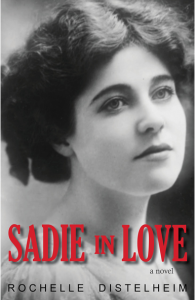
Sadie Schuster—fortyish, plumpish, a suffragist, and recently widowed—spends more time now talking to her late husband, Fivel, than she did when he was alive. Sadie keeps Fivel informed of her daily activities—especially her pursuit of a husband—because “An empty bed is a cold place for a hot-blooded woman.” A lover of ballroom dancing, the moving pictures, and night-school English words, Sadie’s true talent lies in the magic love-knots she artfully crafts for lonely, unwitting, immigrants willing to purchase hope wrapped in a schmattah for fifty cents.
Selling love-knots while seeking love, Sadie consults with her magic spirits to woo Herschel—the muscled ice peddler who reads poetry and pines for his newly departed wife. Her daughter, Yivvy, sells secondhand, possibly “pinched” tchotchkes in her antique shop and plans to marry the Irish cop on the beat. Enter Ike Tabatnik, the “Dance King of Riga, Latvia,” just off the boat and ready to take on America—and Sadie’s heartstrings. Comedy and chaos follow.
A stunning confession, following the wedding of one of her love-knot clients—which begins with one groom and ends with another—pushes Sadie to make a surprising choice. She then throws herself at the mercy of her magic spirits, asking them to do quickly for her what they have been doing for her customers—before it’s too late. Fiction Editor Yona Zeldis McDonough talks to Rochelle Distelheim about what it feels like to have her debut novel published when she’s in her nineties.
- 1 Comment
 Please wait...
Please wait...